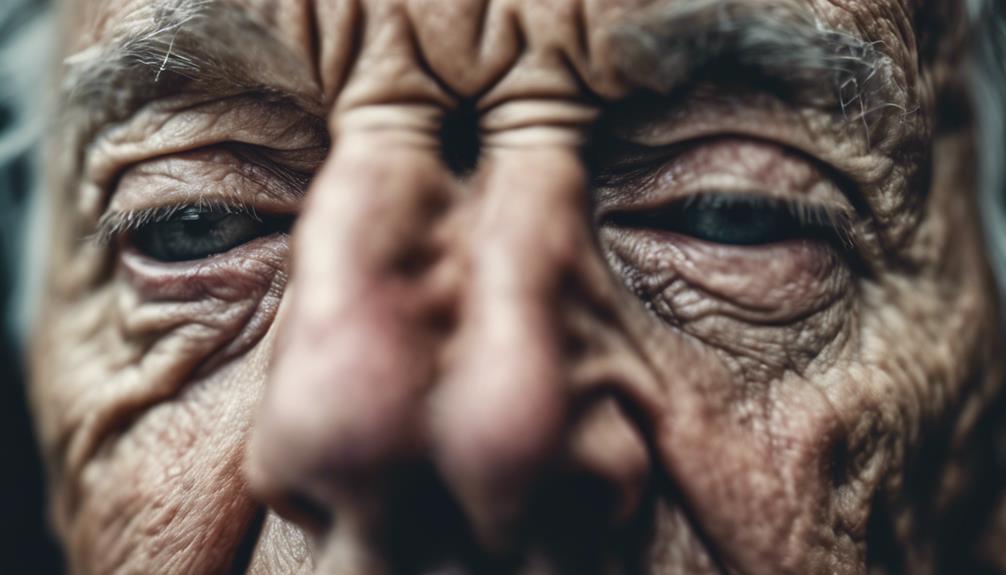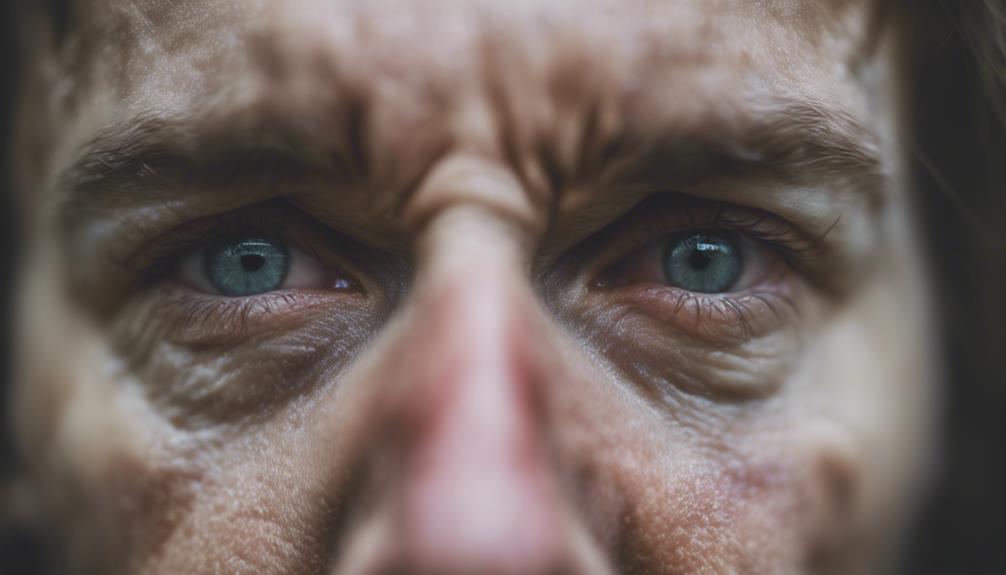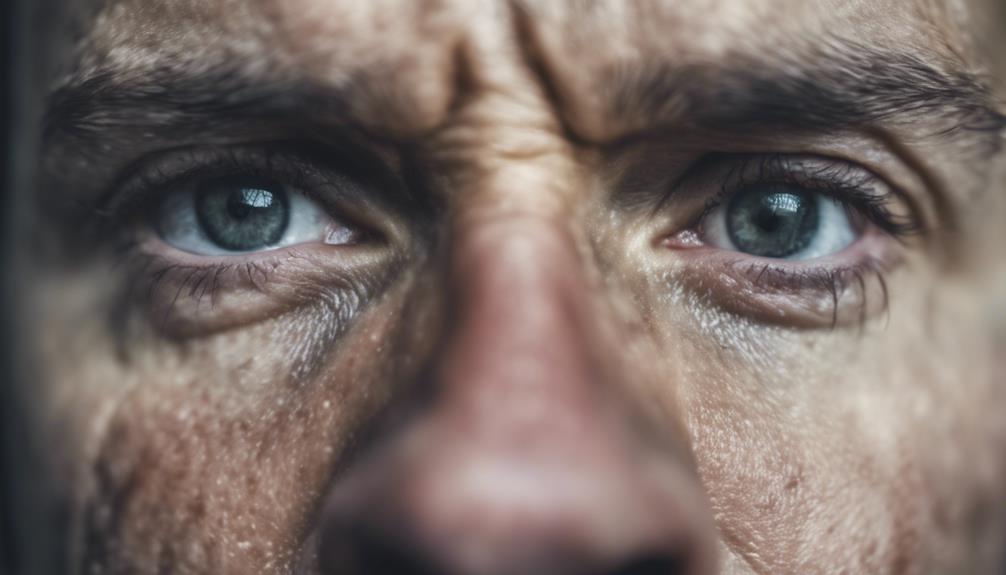Narcissistic abuse can have a physical impact on your face, manifesting in skin conditions like acne and redness caused by emotional distress. Chronic stress can speed up the aging process, resulting in fine lines and dull skin that lacks vitality. Stress-induced breakouts and tension can lead to acne, puffiness, and discomfort in facial muscles. Dark circles, wrinkles, and puffiness around the eyes are common signs of abuse. Chronic stress can also cause a fatigued complexion with a lack of vibrancy. Severe stress may even cause hair loss and thinning due to hormonal imbalances. Recognizing these effects on your face is crucial for effective self-care and emotional well-being management.
Key Takeaways
- Narcissistic abuse can lead to skin conditions like acne and eczema.
- Chronic stress from abuse accelerates facial aging signs.
- Emotional distress triggers stress-induced breakouts and dull complexion.
- Abuse causes facial muscle tension and eye area effects.
- Hair loss and thinning can result from chronic stress and anxiety.
Skin Conditions and Inflammation
Experiencing narcissistic abuse can manifest physically on our faces through the development of skin conditions and inflammation. Chronic stress resulting from emotional abuse can trigger skin issues like acne, eczema, and psoriasis, impacting our physical health.
The inflammation caused by this turmoil can lead to redness, puffiness, and sensitivity in our facial skin. Neglecting self-care due to abuse can exacerbate these conditions, causing dullness and a lack of radiance in our complexion.
It's vital to prioritize self-care practices to maintain healthy skin despite the challenges we face. Taking steps to manage stress, such as engaging in relaxation techniques or seeking support, can help alleviate inflammation and improve our skin's overall appearance.
Premature Aging Signs

Chronic stress resulting from narcissistic abuse can visibly accelerate the aging process, manifesting in fine lines, wrinkles, and sagging skin on our faces. The toll of mental and emotional abuse can show physical signs, impacting our skin's health and appearance.
Signs of narcissistic abuse may not only affect our emotional well-being but also manifest in premature aging. The constant emotional distress experienced in toxic relationships can lead to inflammation in our bodies, contributing to skin issues like redness, acne, and eczema, further exacerbating premature aging signs.
Neglecting self-care due to the emotional turmoil caused by narcissistic abuse can result in tired-looking skin, lacking vitality and radiance. Prolonged exposure to such toxic environments can affect the elasticity and collagen production of our skin, hastening the aging process.
It's important to address the root causes of this abuse to prevent further physical manifestations on our faces and prioritize self-care to maintain skin health and vitality.
Stress-Induced Breakouts

Stress-induced breakouts resulting from narcissistic abuse can greatly impact the skin's appearance, leading to acne flare-ups, redness, and inflammation on the face.
Emotional distress caused by abuse can trigger chronic stress, elevating cortisol levels and potentially exacerbating skin issues such as eczema, psoriasis, and dermatitis. These conditions can manifest as facial redness, irritation, and sensitivity, further affecting one's facial appearance.
Additionally, poor sleep quality stemming from abuse may contribute to dark circles, puffiness, and a dull skin complexion, adding to the overall stress on the skin.
Skin conditions intensified by stress not only impact the immediate appearance of the face but can also play a role in premature aging. It's essential to address emotional well-being alongside skincare routines to manage stress-induced breakouts effectively and maintain healthy skin.
Facial Muscle Tension

Addressing facial tension resulting from narcissistic abuse is crucial in reducing discomfort and tightness in the face. The chronic stress and emotional distress experienced during abuse can contribute to increased tension in facial muscles, affecting our expressions and overall appearance. This tension can result in headaches, jaw pain, and wrinkles, impacting both our physical and emotional well-being.
Prolonged muscle tension may even alter our facial features, making us appear older, tired, or more distressed than we truly feel. To combat this, incorporating relaxation techniques, therapy, and self-care into our routine is paramount. By actively working to release this tension, we can help reduce the physical impact of narcissistic abuse on our face.
Taking time to relax our facial muscles through techniques like gentle massages, mindfulness, or facial exercises can aid in alleviating discomfort and promoting a sense of well-being.
Eye Area Effects

In the aftermath of narcissistic abuse, the effects on the eye area become apparent, revealing physical manifestations of emotional turmoil and distress. Dark circles under the eyes can signal stress and fatigue resulting from the emotional strain of narcissistic abuse.
This constant state of tension can lead to fine lines and wrinkles around the eyes, accelerating the aging process. Puffiness or swelling in the eye area may indicate chronic inflammation triggered by ongoing emotional distress.
Redness or irritation around the eyes can be a reflection of heightened emotional sensitivity and distress caused by narcissistic abuse. Additionally, a hollowing or sunken appearance under the eyes may mirror the emotional exhaustion and depletion experienced in abusive relationships.
It's important to recognize these physical signs as indicators of the emotional toll taken by narcissistic abuse. Prioritizing self-care and seeking support are vital steps in addressing both the emotional and physical effects on the eye area.
Swelling and Puffiness

Experiencing swelling and puffiness on our face can serve as a visible indicator of the emotional turmoil inflicted by narcissistic abuse. When facing such physical symptoms, it's important to acknowledge the deeper impact of emotional abuse on our well-being.
- Facial swelling: Reflects the chronic stress endured from emotional abuse, manifesting as puffiness in the face.
- Physical symptoms: The body's response to emotional distress can result in visible signs like facial bloating.
- Chronic stress: Prolonged exposure to abuse can lead to inflammation, affecting the skin and causing facial swelling.
- Emotional distress: Unresolved emotional turmoil can exacerbate facial puffiness, indicating the need for self-care and support.
- Self-care: Prioritizing self-care practices can help alleviate facial swelling and promote overall healing from the effects of narcissistic abuse.
Jaw Clenching and TMJ

Jaw clenching, a common response to stress from narcissistic abuse, may lead to temporomandibular joint (TMJ) disorder, impacting facial muscles and appearance.
TMJ can cause jaw pain, headaches, and difficulty chewing, affecting overall facial symmetry.
Addressing TMJ through relaxation techniques and stress management can help alleviate pain and improve facial appearance.
TMJ Symptoms and Causes
Stress and teeth grinding are common contributors to TMJ symptoms, which can include jaw pain, headaches, earaches, and difficulty chewing.
- Feeling constant jaw pain can be debilitating, affecting daily activities.
- Experiencing frequent headaches due to TMJ can be exhausting and impact productivity.
- Earaches caused by TMJ can be distressing and affect overall well-being.
- Difficulty chewing can lead to nutritional concerns and further discomfort.
- TMJ disorder affecting facial muscles can cause not just physical pain but emotional distress as well.
Understanding these symptoms and causes is vital in seeking appropriate treatment to alleviate the effects of narcissistic abuse on TMJ. Seeking help and exploring various treatments can lead to relief and improved quality of life.
Jaw Clenching Solutions
Chronic jaw clenching, often exacerbated by narcissistic abuse, can lead to the development of temporomandibular joint (TMJ) disorder. This can result in pain, stiffness, and limited jaw movement.
Stress and anxiety play significant roles in jaw clenching, making it important to address these underlying issues. Techniques like mindfulness, relaxation exercises, and specific jaw stretches can help relieve jaw tension associated with narcissistic abuse.
Seeking professional help from a dentist or physical therapist is essential for managing jaw clenching and TMJ problems effectively. By tackling the root causes of jaw clenching through therapy and self-care practices, individuals can experience healing from the physical impacts of narcissistic abuse.
Dull and Fatigued Complexion

When experiencing narcissistic abuse, our skin can lose its natural glow, making us look tired quickly and our complexion lacking radiance.
This dullness and fatigue in our appearance are often a result of chronic stress, inadequate sleep, and a lack of self-care practices.
It's essential to address these factors to restore vibrancy to our skin and combat the physical effects of emotional turmoil.
Skin Loses Glow
Upon enduring narcissistic abuse, individuals may notice a significant loss of radiance in their skin, resulting in a dull and fatigued complexion.
- Chronic stress from emotional distress can dim the skin's natural glow.
- Lack of self-care due to psychological effects can lead to a tired-looking complexion.
- Anxiety and tension from abuse can affect blood flow, impacting skin vibrancy.
- The toll of abuse can show physically, manifesting as exhaustion on the face.
- Neglecting skincare routines due to the impact of abuse can result in lackluster skin.
Look Tired Quickly
Experiencing narcissistic abuse can swiftly result in a tired and fatigued appearance, greatly impacting the radiance of your complexion. Chronic stress and emotional trauma can take a toll on skin health, leading to a lackluster and worn-out look.
The ongoing psychological distress can manifest physically, making you appear older than you're due to the accelerated aging process caused by increased cortisol levels. Neglecting self-care further exacerbates these effects, contributing to dryness, redness, and overall fatigue in your complexion.
To combat this tired appearance, prioritizing self-care practices and seeking support for the emotional turmoil are essential steps in restoring vitality to your skin. Remember, addressing the root cause of the issue is essential for rejuvenating your complexion and overall well-being.
Complexion Lacks Radiance
Our complexion may lose its natural radiance and appear dull and fatigued when subjected to narcissistic abuse, reflecting the internal toll of stress and emotional turmoil. This emotional turmoil and stress can manifest on our skin, impacting its health and appearance. Here are some emotional facets to ponder:
- Feeling drained and exhausted due to the constant emotional strain.
- Struggling to find joy in daily activities, affecting our overall well-being.
- Dealing with persistent feelings of sadness and hopelessness, which can show on our face.
- Battling with self-doubt and anxiety, leading to a lackluster complexion.
- Needing to prioritize self-care and emotional healing to restore radiance to our skin and inner vitality.
Hair Loss and Thinning

Hair loss and thinning, often triggered by chronic stress and anxiety, can be a visible consequence of enduring narcissistic abuse. The psychological trauma and emotional distress resulting from such abuse can disrupt the natural hair growth cycle, leading to noticeable thinning of the hair. Additionally, the persistent stress and anxiety experienced in abusive situations can trigger hormonal imbalances in the body, further contributing to hair loss.
It is essential to address these physical symptoms of narcissistic abuse by seeking support from a therapist or counselor who can help you navigate the emotional impact of the abuse. Stress management techniques, such as mindfulness, yoga, or meditation, can also aid in reducing the chronic stress that may be exacerbating hair loss.
Taking care of your mental and emotional well-being is pivotal in combatting the physical manifestations of narcissistic abuse, including hair loss and thinning. Remember, seeking help is a sign of strength and self-care.
Frequently Asked Questions
How Does the Body Respond to Narcissistic Abuse?
In response to narcissistic abuse, our bodies often exhibit signs of distress like chronic pain and digestive issues. These physical manifestations can include facial expressions that reveal the toll of the abuse.
Recognizing these responses is vital for understanding the impact of narcissistic abuse. Prioritizing health and healing is essential to address the physical effects of abuse on the face.
It's important to be aware of these signs and take steps towards recovery.
What Are the Facial Features of a Narcissist?
Facial features of a narcissist often include intense eyes, pronounced cheekbones, and a superior expression. These characteristics reflect entitlement, lack of empathy, and a disdainful look. Their facial expressions convey arrogance and a sense of superiority.
The narcissist's appearance may lack warmth and genuine emotion, displaying a fixed, aloof demeanor. These traits can help identify individuals exhibiting narcissistic tendencies.
How Do Narcissists Discard You?
When narcissists discard you, they do so abruptly, lacking empathy or remorse. The process involves sudden withdrawal, gaslighting, blame-shifting, and emotional cruelty. Victims often feel confused, heartbroken, and worthless due to the narcissist's actions.
Discarding is a tactic used by narcissists to assert power and control, leaving victims devastated and traumatized. Recognizing these signs can help protect oneself from further harm.
How Narcissists Punish Their Victims?
When narcissists punish victims, they use various tactics like physical abuse, emotional manipulation, financial control, and isolation. Their goal is to maintain power and control over us, leading to lasting physical and emotional effects.
It's important to recognize these behaviors and seek support to break free from their hold. Remember, you deserve to be treated with respect and kindness, and there are resources available to help you navigate these difficult situations.
Conclusion
To sum up, the physical impact of narcissistic abuse on your face can manifest in various ways, from skin conditions to muscle tension and premature aging signs.
While it may be challenging to address these effects, seeking support and practicing self-care can help mitigate the damage.
Remember, taking care of yourself isn't selfish but essential for your well-being.
Don't let the effects of narcissistic abuse define you, take steps to prioritize your health and healing.











